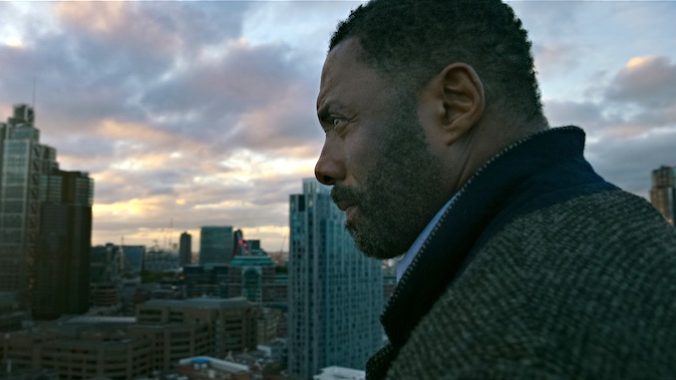Luther Movie The Fallen Sun Heightens the Show’s Entertainingly Preposterous Copaganda
Photo Courtesy of Netflix
[This review was originally published on February 24, 2023]
In the streaming era, what distinguishes a movie from a TV show? Luther: The Fallen Sun, a continuation of writer Neil Cross’s BBC cop drama Luther, is the latest such edge case. A contained two-hour story isn’t new for Luther; the show’s fourth season was only two hour-long episodes. While The Fallen Sun is now in limited theatrical release, the majority of viewers will end up watching it on Netflix (which, weirdly, is not currently streaming the original series), where it premieres March 10. What makes this a “movie-movie” vs. a “TV movie” or just another really short British TV season? If anything, The Fallen Sun feels like a transitional step between what the series was and the movie franchise Netflix clearly wants it to be.
The movie continues from where the fifth season left off in 2019, wherein former DCI John Luther (Idris Elba) was stripped of his badge and arrested. Here, this arrest has been recontextualized; as opposed to just being framed for murder once again, Luther is sentenced to prison due to a dossier containing evidence of all the actual procedure violations the hard-edged cop has committed in his pursuit of justice. The dossier is the doing of the film’s new villain, David Robey (Andy Serkis), a psychopathic tech mastermind who runs an extensive network of blackmail responsible for a missing persons case Luther was investigating.
Robey can’t possibly match Ruth Wilson’s Alice Morgan (not appearing in this movie, still presumably dead for the second time) as the most compelling villain Luther has faced, and his Black Mirror schtick already feels cliche. Serkis, however, makes the character entertaining through sheer over-the-top camp. One shot of his face is enough to announce “THIS IS THE BAD GUY.” He sings “I’m Coming Out” to a woman he burned alive and frames serial killing as “self-expression”—he’d be a super problematic gay stereotype if not for the fact he’s not actually gay. (He catfishes and blackmails a gay victim, whom Luther expresses empathy for, but the only sexual interests he expresses himself are directed towards women.)
The other big new addition to the cast is Cynthia Erivo as DCI Odette Raine, filling the requisite role of “good cop” trying to solve the same case as Luther, but with concerns about his unorthodox methods. This character type is there to provide some degree of realistic emotional grounding, and Erivo is an excellent actress for the job. The horror she encounters is deeply felt, and the tough choices she has to make are presented with genuine suspense even when you know how things will ultimately turn out.